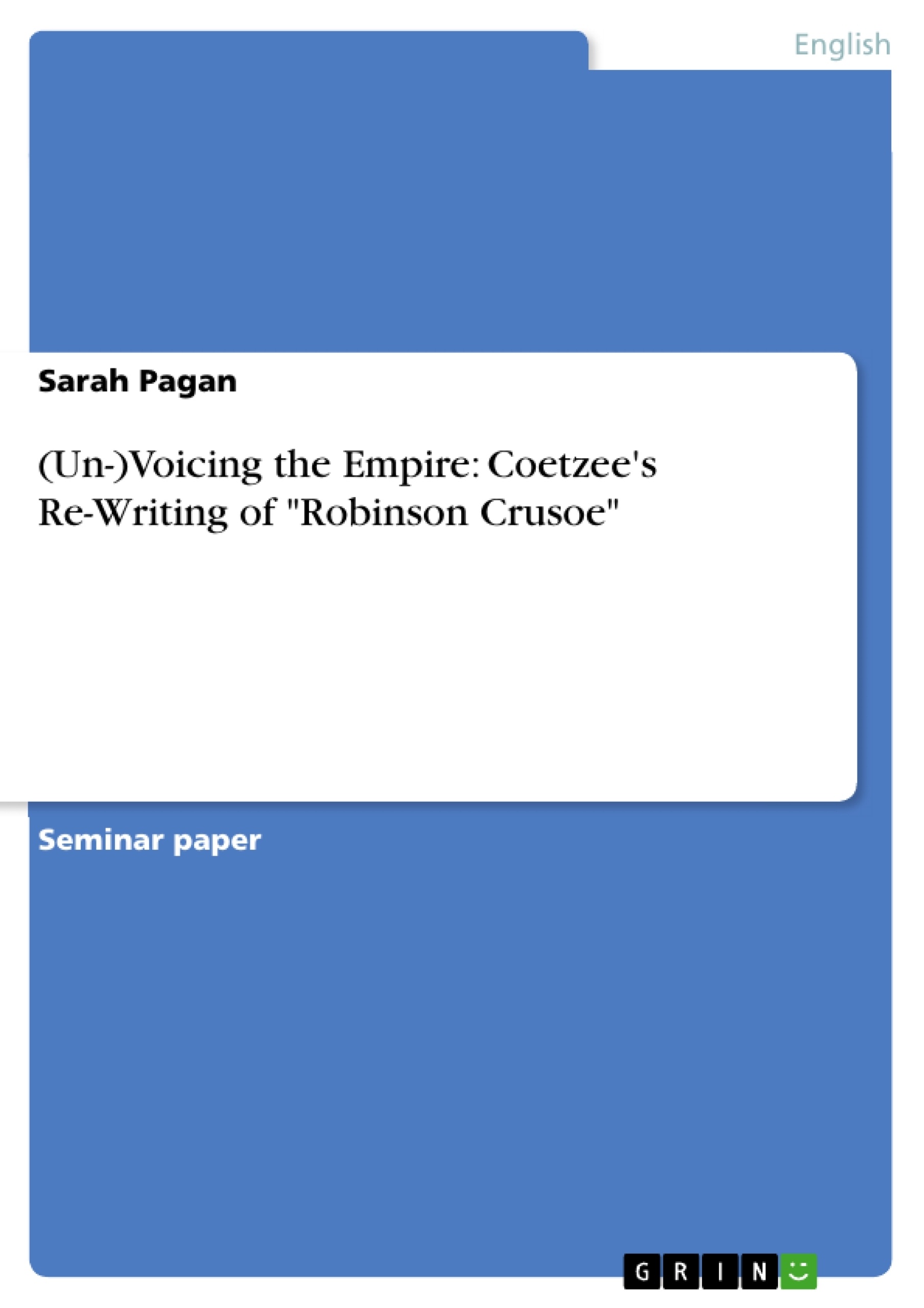“But this is not a place of words. Each syllable, as it comes out is caught and filled with water and diffused. This is a place where bodies are their own signs. It is the home of Friday.”
This passage from the last page of J. M. Coetzee's novel Foe, shows a reflection on the limits of language. It solves the puzzle of the story, of why it has previously failed to tell that of Friday. Although it seems to be the centre of Susan Barton's narration, she could only assume what the core of his story is. The reason for this blank space though is explained in that very quote: As a forcefully mutilated and silenced character, whose tongue has been removed,Friday is, in the end, revealed to not be in the power to express himself with the convention of words or in linguistic terms but embodies a different form of communication.
The novel Foe, written by the South African author J. M. Coetzee is a rewriting of Daniel Defoe's Robinson Crusoe, first published in 1719. It questions the colonial values embedded in the original and deconstructs the concept of Empire. He thus constructs a pseudobiographical fiction to Defoe himself and the original text. As part of the canon it paints a nearly idealistic picture of first colonial settlement.
Inhaltsverzeichnis (Table of Contents)
- Introduction
- I. Establishing Systems of Representation
- I.1. Defoe's Empire
- I.2. Coetzee Demolishes the Canon
- II. Struggling with Author-ity: The Functions of Susan's Narration
- III. In Search of His Voice: Friday's Muteness as the Core of the Story
- Conclusion
Zielsetzung und Themenschwerpunkte (Objectives and Key Themes)
This paper aims to analyze J.M. Coetzee's Foe as a re-writing of Daniel Defoe's Robinson Crusoe, focusing on how Coetzee subverts the colonial values embedded in the original text. The paper explores how Coetzee deconstructs the concept of empire by creating a pseudo-biographical fiction around Defoe and his work. The primary focus is on the representation of Friday, a character who is silenced and manipulated in both texts but in different ways.
- The concept of empire and colonial representation in Robinson Crusoe
- Coetzee's critique of the Western narrative and the silencing of the Other
- The role of language and the limits of representation
- The function of Susan's narration and her struggle to tell Friday's story
- The significance of Friday's muteness as a form of resistance
Zusammenfassung der Kapitel (Chapter Summaries)
The introduction explores the themes of language and representation in Foe, setting the stage for a discussion of how Coetzee rewrites Robinson Crusoe.
The first chapter examines the concept of empire in Robinson Crusoe, focusing on Defoe's depiction of the island as a space of colonization and the master-servant relationship between Crusoe and Friday.
The second chapter analyzes Coetzee's use of intertextuality and the role of the female narrator, Susan Barton, in Foe. It explores how Coetzee subverts the authority of the canon and the limitations of language.
The third chapter focuses on Friday's silence and its significance in Foe. It examines how his muteness reflects the oppression of the colonized Other and becomes a powerful form of resistance.
Schlüsselwörter (Keywords)
This paper explores key concepts such as colonial representation, the Other, language and voice, intertextuality, the canon, and the deconstruction of empire. It examines the works of J. M. Coetzee and Daniel Defoe, focusing on their portrayals of Friday and the limitations of Western narratives.
Frequently Asked Questions about Coetzee's "Foe" and "Robinson Crusoe"
How does J.M. Coetzee's "Foe" relate to Daniel Defoe's "Robinson Crusoe"?
"Foe" is a postmodern re-writing that deconstructs the colonial values and narrative authority of the original 1719 novel.
What is the significance of Friday's muteness in "Foe"?
Friday's silence represents the oppression and silencing of the colonized "Other" who cannot express himself within the Western linguistic tradition.
Who is Susan Barton in the novel?
Susan Barton is a female narrator who finds herself on the island and later struggles with the author (Foe) to have her and Friday's story told accurately.
How does Coetzee critique the concept of Empire?
He exposes the master-servant dynamic as a construct of power and highlights the limits of Western language in representing non-Western identities.
What does the passage "bodies are their own signs" mean?
It suggests that for the silenced Friday, communication exists beyond words, through physical existence and presence, which the narrator fails to fully capture.
- Arbeit zitieren
- Sarah Pagan (Autor:in), 2012, (Un-)Voicing the Empire: Coetzee's Re-Writing of "Robinson Crusoe", München, GRIN Verlag, https://www.grin.com/document/209144



